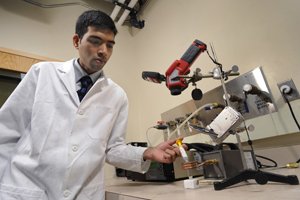Jan 19 2010
Carnegie Mellon University and Intel Corporation will unveil a new class of materials called solder magnetic nanocomposites that could help streamline the process of computer electronic packaging. The milestone research will be discussed at the 11th annual Magnetism and Magnetics Materials Conference Jan. 18-22 at the Marriott Washington Wardman Park in Washington, D.C.
 AshFague Habib, a Ph.D. materials science and engineering candidate, and a member of the research team working on solder magnetic nanocomposites.
AshFague Habib, a Ph.D. materials science and engineering candidate, and a member of the research team working on solder magnetic nanocomposites.
A Carnegie Mellon research team led by Michael McHenry, professor of materials science and engineering, biomedical engineering and physics, in collaboration with Raja Swaminathan, Intel senior packaging materials engineer, have devised an RF heating technique for solder magnetic nanoparticle (MNP) composites that can sufficiently heat solders to cause reflow without placing computer chips in conventional ovens. A solder is a metal alloy used to bond metals together. McHenry's team includes Ph.D. materials science and engineering candidates AshFague Habib and Kelsey Miller, and Matt Ondeck, a junior in materials science and engineering.
At present, state-of-the-art techniques for making computer chips during the electronic packaging process involve use of hot air convection or the use of infrared ovens. Because heating the chips in these ovens requires significant energy costs and also poses the risk of chip warpage, McHenry's team worked collaboratively with Intel's Swaminathan to develop a tool that uses radio frequency coils to heat specially designed magnetic particles that are mixed with solder pastes.
"By varying the concentration and composition of these magnetic particles we can control the time it takes to heat them, which ultimately helps improve the speed of processing them, and potentially lowers the cost," said McHenry, co-publication chair of the MMM/Intermag Conference.
The annual conference brings together scientists and engineers interested in recent developments in all branches of fundamental and applied magnetism. Major emphasis is placed on experimental and theoretical research in magnetism, the properties and synthesis of new magnetic materials, and advances in magnetic technology.
"It is always gratifying to see an idea actually demonstrated in reality," Swaminathan said. "This first successful demonstration could open up possibilities of other applications even outside microelectronic packaging. Though we have a long way to go in implementing a locally melting solder in actual applications, the concept of local heating opens up many processing opportunities that we are working to further explore with McHenry. There is significant opportunity here for good basic science and technology exploration," Swaminathan said.
In addition to speeding up the solder process, McHenry's team also improved the electrical interconnects during the critical electronic packaging process. Because chip warpage is more of a problem at the temperature required to make lead-free solders reflow, this technology developed by Carnegie Mellon researchers will have additional benefits with these more environmentally friendly solders.
"There are many possibilities for this process throughout a variety of industry sectors, including the semi-conductor sector, aerospace and data storage industry," McHenry said.
Research funding for this project comes from a broad swath of sources, including chip making giant Intel and the National Science Foundation.